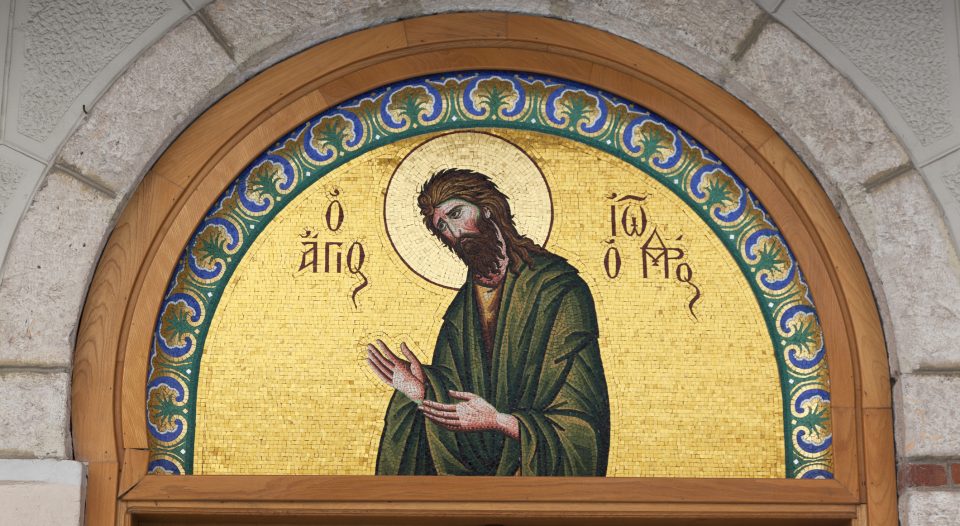Lectionary for Dec. 17, 2023
Third Sunday of Advent
Isaiah 61:1-4, 8-11; Psalm 126;
1 Thessalonians 5:16-24; John 1:6-8, 19-28
In a Nov. 10 statement, the Patriarchs and the Heads of Churches in Jerusalem called for the celebration of Advent and Christmas to be intentionally different this year in light of the war between Israel and Hamas. Instead of “unnecessarily festive activities,” they asked people to focus more on the spiritual meaning of Christmas, especially through pastoral care for others and liturgical celebrations in which all the faithful, not just leaders, participate. As we prepare to welcome the Prince of Peace, we must pray for the end of all war. But then what? Peace can’t be merely the absence of overt violence—it must be freedom, wholeness and health. This week’s lectionary readings help us focus on what we truly hope for in Jesus’ incarnation in this world.
As we discussed last week, the scroll of the prophet Isaiah is intended for an audience who knows what it means to be at war, defeated, and yet holds out hope of God’s redemption. Isaiah 61 speaks to people who have been brought low by violence. God’s Spirit anoints human voices to bring good news to those who are humble and refuse to exalt themselves. God sends human hands to bind the wounds of those who suffer at the hands of others. And, in an intentional doublet, God sends voices of release to proclaim freedom to captives and an opening of the dungeons for those who have been bound up.
The psalmist also foretells a time when the Lord will bring back the captives of Zion, leading to dreamy laughter and joyful shouting (126:1-2). Those whom God sends bring good news not only of the end of hostilities but good news of redemption and rebuilding.
After the announcement of the end of hostilities and captivity, God sends professional comforters to those mourning in Zion, who first sigh deeply along with those who grieve (Isaiah 61:2). The comforters then transform the mourners’ physical reality. Instead of ashes of mourning, those who weep are given garlands as if they had been victorious. Instead of mourning, those who weep are anointed with the oil of gladness. And instead of a disheartened spirit, those who mourn are given a cloak of praise.
John the Baptizer is a messenger and herald, not the main event, but the one who announces the headliner whom everyone has come to see. In a word—John knows who he is and who he isn’t.
The comforters whom God sends are deeply in tune emotionally, knowing when it’s time for silent accompaniment and when it’s time for the changing of clothes and minds. In other words, the healers and comforters whom God sends know who they are and what they are supposed to be doing.
In the Gospel assigned for this week, various religious leaders seek to learn who John the Baptizer is (and isn’t). John knows that he is not the messiah, not the prophet of Deuteronomy 18:14-22, and not Elijah returned to the earth. Instead, John says he is fulfilling (in a new way) the words of Isaiah, who announces good news in the wilderness that God is coming to rescue the people. John the Baptizer is a messenger and herald, not the main event, but the one who announces the headliner whom everyone has come to see. In a word—John knows who he is and who he isn’t.
How could we be like John the Baptizer this Advent? I suggest that we should know our roles. As members of the body of Christ, we are called to the actions that Isaiah and the psalmist celebrate. We are called to bring good news to the humble and lowly. We are called to do what we can to heal—both physically and emotionally/psychologically. And we are called to announce freedom for those who have been taken prisoner or hostage. Lastly, we are called to be sensitive comforters. We don’t rush to platitudes or encourage inauthentic “healing.” Instead, we sigh with those who can’t catch their breath among their sobs. And when the tears stop, we stick around for all the work of healing—rewriting narratives of trauma into stories of survival.
Like John, we aren’t usually called into the limelight as the main character in unfolding dramas. Far more often we are simply called to faithfully witness what God is doing in the world. And, hopefully by the time you’re reading this, God is at work healing and restoring this Advent. So, as the Patriarchs and Head of Churches in Jerusalem advise, let us refrain from unnecessary frivolity and instead recommit ourselves to the deep work of celebrating Jesus’ physical incarnation into the world. Let us be the hands, feet, hearts and voices of Jesus.






